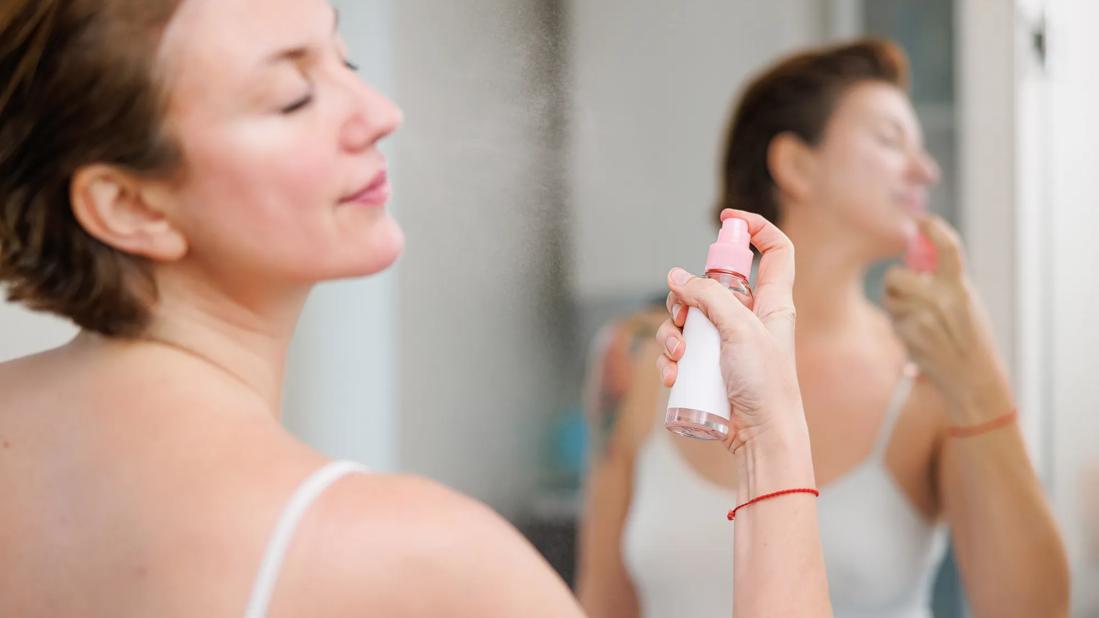New formulas are less drying and contain water-based and skin-loving ingredients

Image content: This image is available to view online.
View image online (https://assets.clevelandclinic.org/transform/f1ccd93c-15fb-40ec-b5ac-9f879cd9dc62/face-toner-spray-2213857510)
Person misting their face in the bathroom
TV shows and movies tend to get the reboot treatment — new and improved characters, plotlines and backstories.
Advertisement
Cleveland Clinic is a non-profit academic medical center. Advertising on our site helps support our mission. We do not endorse non-Cleveland Clinic products or services. Policy
When it comes to skin care, toner is back in the starring role thanks to its evolution from an alcohol-based solution to one that has skin-loving ingredients to target different skin types and concerns.
So, what does toner do for your face? This new class of toners is water-based, soothing and, in some cases, can brighten skin and fight aging, leaving your skin feeling clean and hydrated.
A toner is typically a water-based lotion or tonic that you use after cleansing and before moisturizing, says dermatology resident Angela Wei, MD. While it may look and feel like water, it does a lot more — think of it as a primer for the rest of your skin care routine. A toner may also be called a tonic, exfoliating acid or an essence.
“Unlike old-school toners that had high alcohol content designed to remove oil on the skin and were often drying and irritating, modern-day toners are much more moisturizing and soothing,” explains Dr. Wei. “They can help prep your skin for additional cosmetics and products that come afterward rather than just stripping away oil and grime.”
You can find a variety of toners at stores and online. Some are infused with peppermint, aloe or eucalyptus to help soothe skin.
Advertisement
And don’t mistake a toner for an astringent. Astringents are usually alcohol-based and used to control oil — but they can be harsh and dry out your skin. A toner gently refreshes your skin without stripping it of moisture.
Face toner benefits include:
“It usually takes between six weeks and three months to see any effect from using a toner,” reports Dr. Wei. “The improvement may be subtle, but toners really make everything else work better.”
If your toner is designed to help prevent acne or reduce hyperpigmentation, then you may see results in about two to three months. And Dr. Wei says that you may see more of a payoff over time from using a toner, especially if it has anti-aging ingredients.
“You may not see an immediate difference. But over the course of a few years, you may notice your skin aging more slowly,” Dr. Wei notes.
As with many skin care options, there isn’t a one-size-fits-all toner out there. They come in a variety of formulas that cater to your skin tone, type and concerns.
“It’s important to look at the ingredient list. First, look to see if there’s any alcohol used and if so, how much,” Dr. Wei advises. “A small amount of alcohol can be good for people with oily skin or who have acne.”
Here’s what to look for (or avoid) based on your skin needs:
Advertisement
When you think about applying your skin care products, Dr. Wei recommends starting with the lightest texture or thinnest consistency, then working your way up to products that have the thickest consistency.
“Toners should be used after cleansers because they’re water-based,” Dr. Wei instructs. “Sometimes, toners come in a spray form, so you can mist it onto your face directly. Sometimes, they’re applied with a cotton ball, swab or round.”
When it comes to how to apply toner, it couldn’t be easier. All you need to do is gently swipe (or spray) the toner over your face after cleansing. No need to wash it off.
And how often you use a toner is up to you — you can use it once or twice a day. If your toner has strong acids or other active ingredients that may be irritating, you can start with every other day and work your way up.
“You can fit it into your routine based on how your skin is tolerating the product and what other products or moisturizers you use,” Dr. Wei suggests. “Some people only do their skin care routine once a day and don’t need to necessarily add a second step or a second component of their routine.”
If you’re looking to up your skin care game, adding a toner can be beneficial.
Advertisement
“There are so many toners out there on the market. And many can help with any skin problem that you may have, from acne-prone skin and rosacea-prone skin to dry or oily skin,” says Dr. Wei. “There’s a toner for almost everybody.”
Advertisement

Sign up for our Health Essentials emails for expert guidance on nutrition, fitness, sleep, skin care and more.
Learn more about our editorial process.
Advertisement
Although it could be used as a moisturizer, this new trend is not recommended
It’s a great disinfectant for around your home, but not for your skin
Changes in texture, smell, color and performance are signs it’s time to throw the cosmetic item away
Strengthening your skin barrier, simple routines and minimizing products are ongoing, popular trends
Moisturizing, running a humidifier and adjusting your showers may help keep itchiness and irritation at bay
Glycolic acid benefits skin tone, texture and pigmentation by exfoliating dead skin
Some gentle soap and warm water go a long way when you’re washing these cosmetic tools regularly
At a minimum, in the morning, apply a cleanser, followed by a moisturizer and sunscreen, in that order
Prioritize your health by managing stress, strengthening your social connections and getting quality sleep
Bolsters, blankets, pillows and blocks can offer extra support, stability and comfort
Allergies, postnasal drip, asthma or reflux could be to blame for a cough that won’t quit